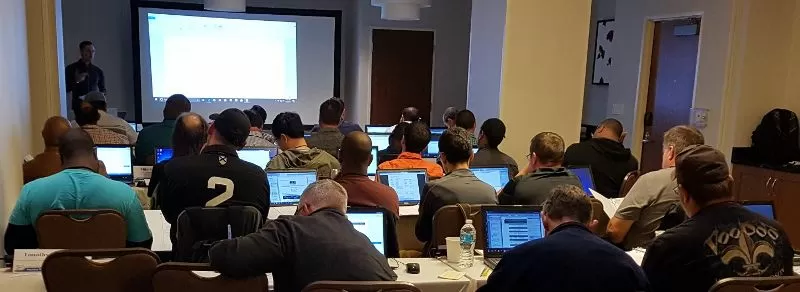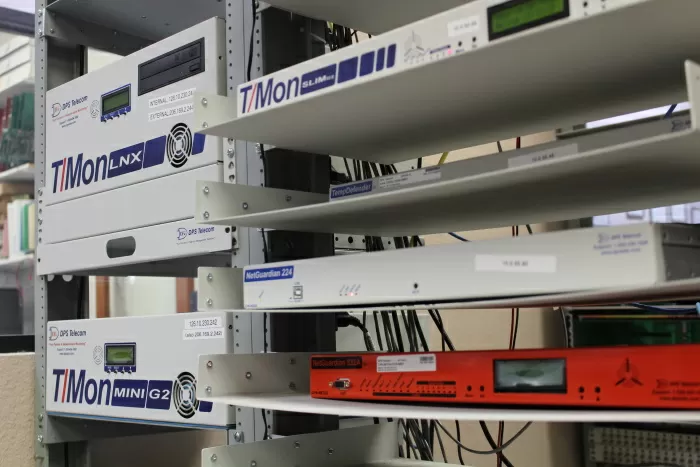Check out our White Paper Series!
A complete library of helpful advice and survival guides for every aspect of system monitoring and control.
1-800-693-0351
Have a specific question? Ask our team of expert engineers and get a specific answer!
Sign up for the next DPS Factory Training!

Whether you're new to our equipment or you've used it for years, DPS factory training is the best way to get more from your monitoring.
Reserve Your Seat TodayWhen you buy a new SCADA system for your network, or even before you make the investment, it's vital to know how to use your system and get the most out of it. There are many different options to learning SCADA, but attending a SCADA training session is the one that brings more benefits - think about in-depth knowledge of your system, more time efficient, and etc.
So, that's why it's important to consider attending a SCADA training session. However, not just any class will do. You need to know what separates okay classes from great ones.

But, what you should expect from an efficient training? What you should be learning? Should you be using real equipment?
At DPS, we offer training for qualified professionals in multiple industries, and we know there's really nothing quite like a competent training to increase your SCADA skills.
So, let's take a look at some aspects of the best SCADA training classes and what you should expect from them.
A SCADA training should be a fast way to learn the full capabilities of your equipment.
If you work with remote monitoring equipment, or train or manage those who do, it's a good idea to attend a SCADA training. You'll ensure that you are doing everything you can to safeguard your network reliability.
Attending a SCADA training is a financial/time investment that will repay you in terms of valuable information, faster implementation times, more efficient alarm monitoring, and better uptime.
Ultimately, you'll be able to do more with your network monitoring than you know. A SCADA training should be a fast way to learn the full capabilities of your equipment. Because in a class you'll be actually dedicating a specific time to dive into all your devices' capabilities, also having the opportunity to talk to your instructor about the features you use most and ask any questions - which is not possible if you're trying to make time to read your device's manual.
Also, if you are thinking about buying network alarm monitoring equipment, but want to learn more about the technology before making a decision, enrolling on a SCADA course is also important. It might help you decide if your potential SCADA equipment is actually a perfect fit for you.
An in-depth course will most likely help you understand your system in a better way than trying to teach yourself with a manual. Even if you don't have any questions about what you're reading, a manual only goes so far in terms of diving into the specific features and capabilities you use most. Also, the class should teach you advanced techniques - tips and tricks that will save you hours of work and make your monitoring much more effective - like effective troubleshooting.
But what makes a SCADA training course effective?
Your instructors should be skilled engineers with who actually have worked on designing your product and on-field implementations. There's no one more knowledgeable about your equipment and about how to use it.
Instructors that don't work with your SCADA system on a daily basis, performing the same tasks that you'll do, are a red flag
Look for SCADA training classes that allow you to work directly with the monitoring equipment. Having a chance to work hands-on with monitoring equipment you'll use in your company and in the field gives you the opportunity to test applications in a safe, offline environment before you implement them in the actual field.

On your job, you can't take your essential SCADA system offline to experiment with its features - but you should be able to do it on a fully equipped training laboratory. This gives a unique know-how that only comes with personal experience.
Effective courses should also have classroom exercises in which your instructor will guide you, step-by-step, through databasing and configuration, while you follow along on your own machine. So, when you go back to your job, you'll know your system with the kind of confidence you only get from hands-on experience.
Avoid SCADA courses that hold too many people in one class.
Small classes (no more than 15 people) are ideal so your instructor can focus on you. If you want to spend more time on a topic, your instructor will be able to meet with you on a one-on-one breakout session.

When you attend a remote monitoring manufacturer training, you get to talk to the engineers who designed your equipment, tour the factory where everything is built, and even see the latest products.
You could also give them suggestion on how they can improve their products or services - they should listen to you and act to meet your needs.
Last but not least, you should feel welcomed.
Also, they also should give you a chance to casually unwind with your classmates. This way you'll be able to share SCADA tips and experiences, and you'll get to know people you can relate to.
Physical classes are the best way to learn what remote monitoring can really do for you because you'll get to see and practice all the capabilities that your equipment has.
Your SCADA course should provide you with individualized, hands-on instructions based on field-tested techniques and experience.
You also should learn:
What telecom equipment can and should be monitored remotely.
The nuts and bolts of how network alarm monitoring works.
Essential remote monitoring capabilities every alarm system must have.
How to adapt alarm monitoring to the protocols and communications transports you already use.
How network alarm monitoring reduces operational costs and increases profitability.
Make sure your curriculum also includes:
Databasing alarms
Provisioning remotes
Configuring and operating control relays
Alarm monitoring techniques
Industry best practices
And valuable expert tips on troubleshooting
Your curriculum should be built around the product features, monitoring technologies, and network management techniques that you use (or will use) most.
Now that you know some of the things that you should be learning at a good SCADA training class, you probably already guessed that you will be given a lot of material.
It's essential that you are provided with full documentation of the curriculum so you could better take away what you learned and apply it at work. Your course should include a complete resource and reference kit, covering every section of the training.
This kit must include a reference to the most often used features of your equipment, as well as other resources, such as white papers on industry best practices and network monitoring issues. It's an invaluable reference that you'll want to keep handy and consult often.
If you have a large team that needs to be trained on remote monitoring, the best budget-friendly option is to have your SCADA equipment provider send a technician to your location and provide on-site training.
Obviously, you'll be able to save a considerable amount of travel expenses because you won't have the expenses of sending your staff to another city.
This on-site class should:
Provide further training to your entire team to allow for an overall increase in your equipment usefulness.
Create an informed and knowledgeable staff.
The course content should be based on the one offered at your provider headquarters, but because it's an on-site course, it should be customized to meet your exact training needs.
A best practice in terms of on-site training is to have your SCADA provider team to perform a turn-up assistance program. A turn-up is the best and fastest way to tune up your system if it's not running optimally.
There are many different ways in which you could potentially find yourself in this position:
The people who were originally trained haven't been there for a long time.
Originally, there was no budget for training.
The original plan was to self-educate.
Regardless of the cause, this is a big issue because your company is not taking the most out of its investment in monitoring, and your network visibility isn't as optimized to where it should be. Time is being wasted because you are not able to leverage the tools that are already in place. The only thing that is really clear is that it's your job to see that everything gets properly deployed very quickly.
So, to avoid that, your SCADA provider's team should come to your site to review your system's current configuration, work with the system operators to show them how to best use and configure the system for your needs.
They should also cover RTU configurations and have a special section where they provide basic training to your everyday users. You must end up with a system that runs great that you know how to maintain it going forward.
Do you think that attending a SCADA training class would be beneficial to you?
Then you might want to take a look at the DPS Factory Training curriculum:
Day 1: RTUs
RTU Comparison
Hardware
Power up your unit
Upgrade and backup
Day 2: T/Mon Monitor Mode
T/Mon comparison
Basic alarm theory
T/Mon monitor mode
Day 3: T/Mon Edit Mode
T/Mon edit mode
Database backup and restoration
Day 4: SNMP
T/Mon GFX
SNMP intro
MIBs
T/Mon event forwarding
Day 5 (optional): ASCII
This optional half-day class focuses on ASCII. Learn the basics of the protocol, and how your T/Mon processes ASCII messages.
If you want the training to cover other topics, simply let us know, and we will change the curriculum to fit your needs.
We can send a team to visit you in order to perform on-site training and turn up assistance as well. Although, the training content is based on our Factory Training, it can be tailored to meet your exact requirements.
When our clients come to DPS Factory Training and learn all the capabilities of their equipment, they have what we call "aha!" ideas. These are breakthrough realizations of what they can do with their network monitoring, and how it can save them time, money, and trouble.
So, we've put together the Biggest "Aha!" Ideas from DPS Telecom Factory Training White Paper. This way, even if you don't know if attending a SCADA training is the best option for your scenario, you can still learn tips and tricks that will make your monitoring more effective and save you hours of work.

Morgana Siggins
Morgana Siggins is a marketing writer, content creator, and documentation specialist at DPS Telecom. She has created over 200 blog articles and videos sharing her years of experience in the remote monitoring industry.